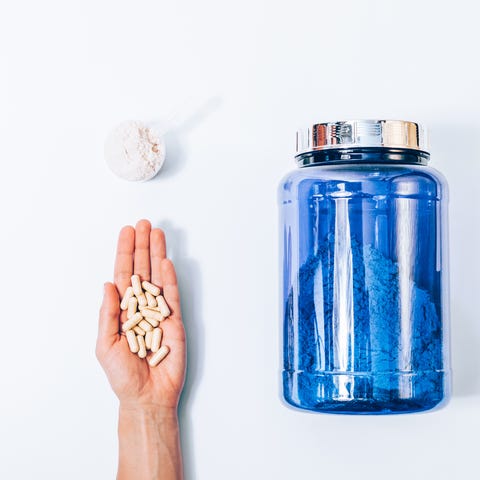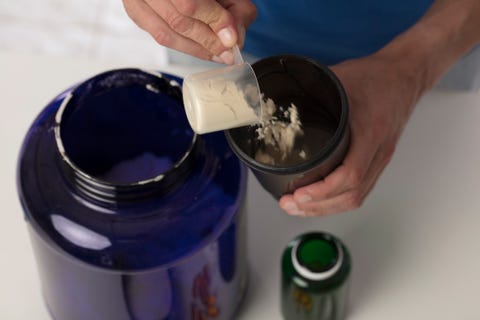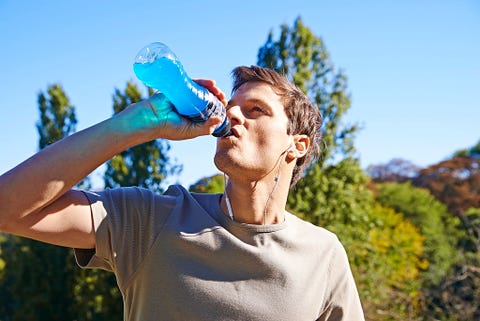
Some people think that creatine is some kind of magical supplement ground down from pulverized unicorn horns.
Okay, maybe no one thinks that, but there’s still some mystery around creatine supplements. There really shouldn’t be, because creatine is found naturally in animal meat. All supplements do is isolate the nutrient and serve it up as a powder, pill, or liquid.
The right bottle of creatine can boost mass and strength. The wrong one can do nothing.
Here’s how to pick the best creatine supplement for your goals.
Always buy creatine monohydrate.

Getty Images
Most research done on the amino acid creatine shows that creatine monohydrate is the safest, most effective form of the supplement, says Andrew Jagim, Ph.D., director of sports-medicine research at the Mayo Clinic Health System. Other forms (ethyl ester, hydrochloride, magnesium chelate) are usually more expensive and don’t have the same breadth and depth of scientific backing.
Prioritize powders over pills.
“Creatine is not stable in liquid solution,” Jagim explains. “That’s one reason you have to mix powders well and drink them quickly.” So skip the liquid creatine. And unless you love taking pills, skip those too. You generally have to swallow two to five capsules daily to achieve the recommended five-gram dosage, says Mike Roussell, Ph.D., Men’s Health nutrition advisor. (And sometimes even more during the controversial creating loading phase.)
Seek out the crystals.

Getty Images
No matter how much you can curl, creatine doesn’t dissolve easily in a shaker bottle. Roussell recommends buying a product that contains micronized creatine. “This is creatine that’s been broken down into smaller crystals. The greater surface area improves its ability to dissolve into water,” he says. One good brand: Creapure, which scientists use regularly in studies and which has a long track record of safety and purity, Roussell says.
Turn off the ’lytes.

Getty Images
There’s no need to pay more for a creatine with added sodium, magnesium, or other electrolytes. These nutrients may support exercise performance, endurance, and recovery, yes. But electrolytes don’t enhance creatine’s effects, Roussell says. If you want electrolytes with your creatine supplement, just mix the powder with a sports drink.
Make sure you count your carbs.
Carbohydrates help drive creatine into your muscles, says Roussell, who adds that most studies show a benefit from 80 to 100 grams of carbohydrates. If you’re low-carb, don’t freak out. “Forty grams is likely sufficient and still better than just creatine alone,” Jagim says. Some creatine powders contain carbs, and mixing with a sports drink works here too.
Look for the NSF seal.
Since the FDA doesn’t evaluate supplements, you need to CYA. Luckily, all you have to do is check for the NSF International “Certified for Sport” mark. This seal means that the product contains what the label says it does, has been tested for contaminants and for substances banned by major athletic organizations, and is made at a facility audited twice annually for quality and safety.
The Bottom Line
Choose micronized creatine-monohydrate powder (write all that down if you have to) with the NSF seal on the label. Just make sure you’re taking in some carbohydrates with your creatine. They help your muscles absorb the supplement.
Source: Read Full Article